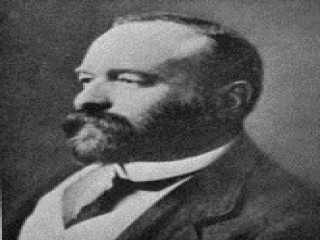
Franklin Giddings biography
Date of birth : 1855-03-23
Date of death : 1931-06-11
Birthplace : Sherman, Connecticut, U.S.
Nationality : American
Category : Science and Technology
Last modified : 2011-04-27
Credited as : Socilogist, educator an science writer,
Franklin Henry Giddings was an American sociologist, educator, and one of the leading writers in the social sciences in the late 19th century.
Franklin Giddings was born on March 23, 1855, in Sherman, Conn. After graduation from Union College, he turned to newspaper work in Connecticut, and during the next 10 years he developed great skill in analyzing public issues. He began to publish articles in scholarly journals, mainly on economic questions, and received favorable notice from the academic world. In 1888 he was made lecturer on politics at Bryn Mawr College and soon became a full professor. In 1894 he was invited to a new chair in sociology and the history of civilization at Columbia University, where he developed one of the nation's leading departments until his retirement in 1928.
The major themes in Giddings's work were fully presented in his Principles of Sociology (1896), where he clearly described sociology as a special basic social science, rather than the sum of other social sciences. Specifically, he conceived of sociology as the study of developing forms of human society, based on the changing intensity of "consciousness of kind," or collective feelings of similarity and belonging. These feelings are expressed in two complementary kinds of associations: relatively cohesive and intimate groups, and groups designed for highly specialized interests. Societies develop through normal conflicts and readjustments between these two forms. These themes were illustrated in Inductive Sociology (1901) and Readings in Descriptive and Historical Sociology (1906).
In subsequent years Giddings gave greater emphasis to processes of social causation and collective achievement. One application of this approach was crucial to the essays in Studies in the Theory of Human Society (1922), where he asserted that the environment affects the character of a population and, indirectly, its ability to overcome environmental limitations and to create more complex techniques and solutions. Another application was Giddings's controversial espousal of United States imperialism in Democracy and Empire (1900). Finally, in a posthumous work called Civilization and Society (1932), Giddings analyzed the practical conflict between government and formal rules, on the one hand, and custom and folkways, on the other, in periods of rapid social change.
Toward the end of his career, Giddings was a pioneer in encouraging the use of careful quantitative and experimental methods in studying social phenomena (The Scientific Study of Human Society, 1924). Among his most famous students were F. Stuart Chapin, Howard W. Odum, and Donald Taft, who transmitted his orientation to more than 3 decades of sociological research and training. He died on June 11, 1931.
















